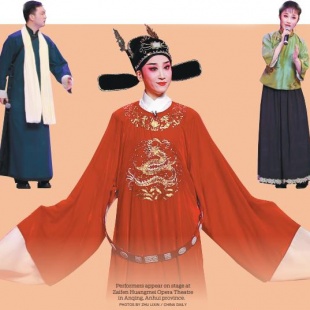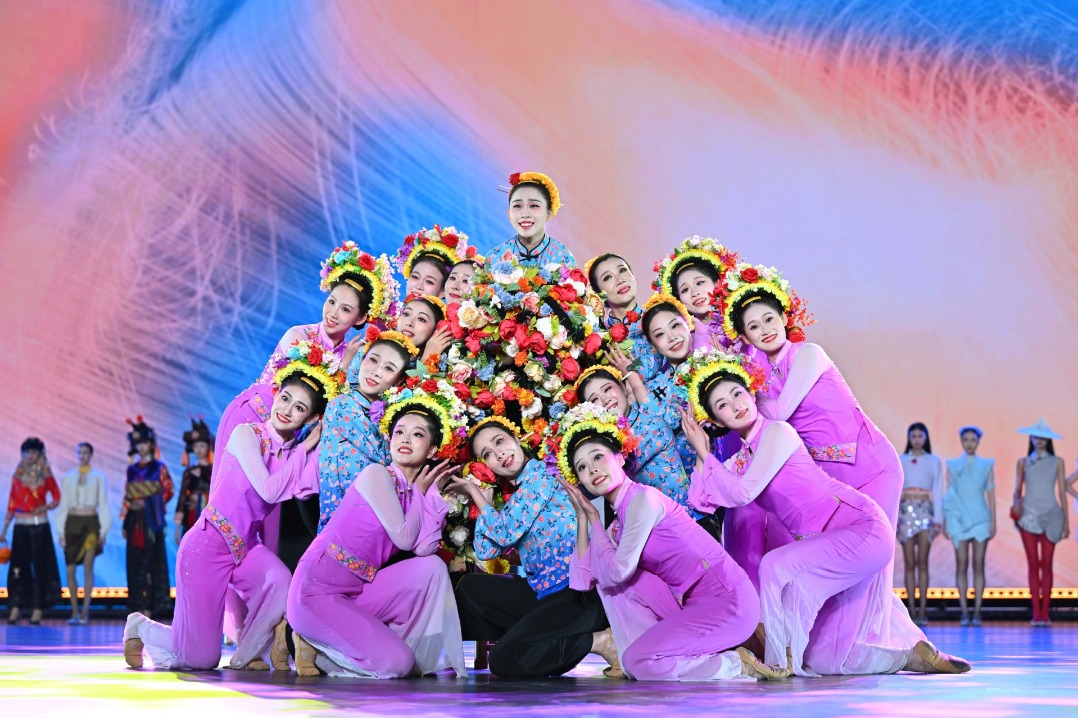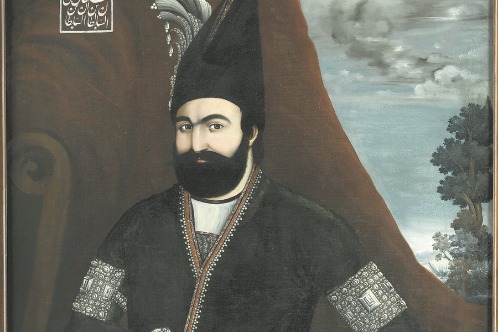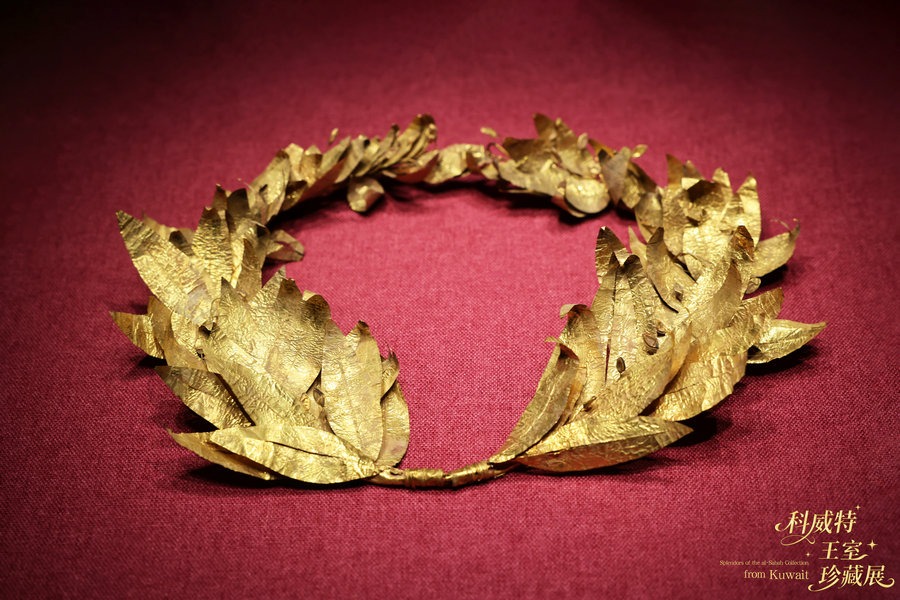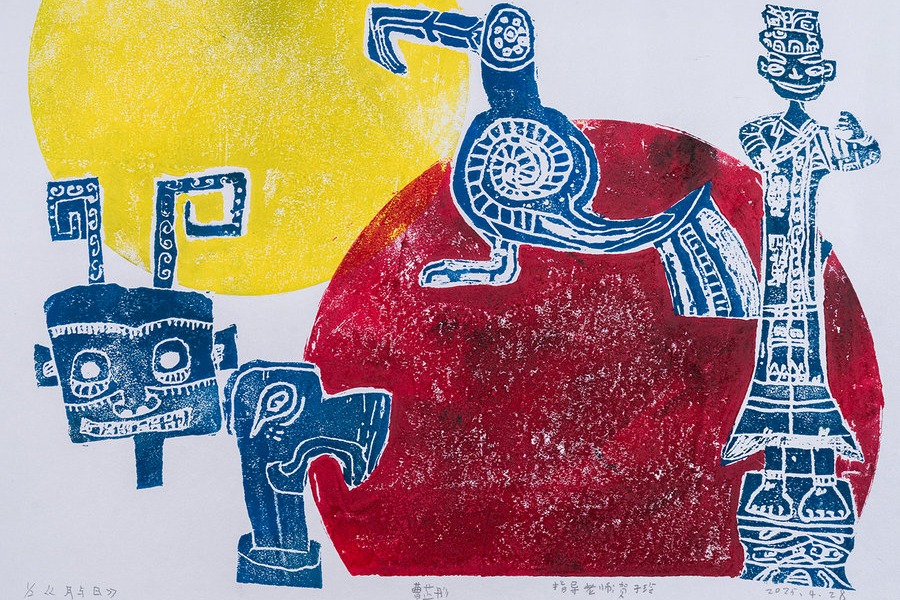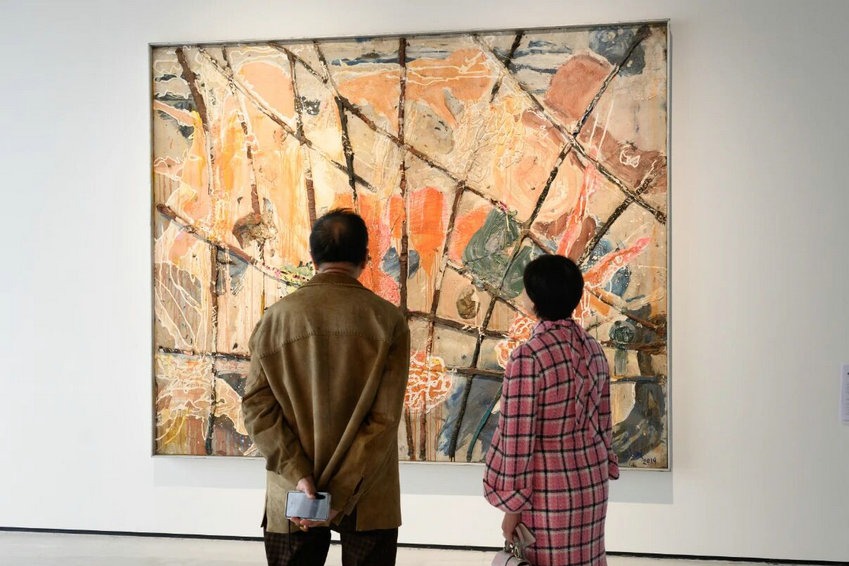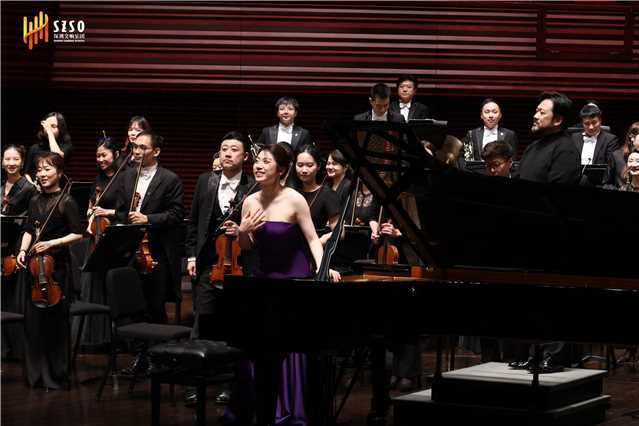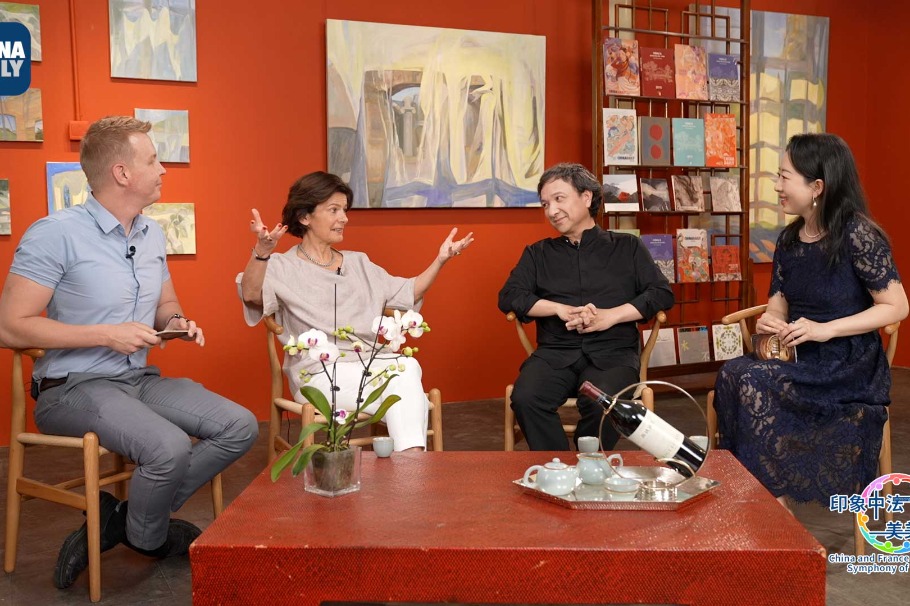Art form widens its reach, sends cultural message


Huangmei Opera brings new performers to the stage
An outdoor stage made from cement stands in a village in Huaining, Anhui province.
On this single rostrum, a man and a woman, their voices resonating with pure, melodious beauty, perform a classic Huangmei Opera work, Tian Xian Pei, which translates as A Goddess' Marriage. The work depicts a folk tale centered on the love story between a goddess and a man, while its lyrics portray a typical scene in daily life.
The lyrics include:
You plow the fields, and I weave the cloth. I fetch water, and you water the garden. Even though the modest home may be in disrepair, it can still offer protection from the wind and rain. As long as there's love between husband and wife, life feels sweet even in hardship.
Villagers bring small wooden stools from their homes to an open space in front of the stage, creating an impromptu audience area. Some decide to perch on their bicycles or tricycles scattered around the stage, while a few enjoy warm bowls of porridge, sipping thoughtfully as they become engrossed in the plot unfolding onstage.
Children, brimming with curiosity and wonder, playfully climb on and off the stage.
After each show, performers often receive gifts from the villagers, including fruit such as peaches and plums, which have been picked from the residents' trees.
This scene of villagers immersing themselves in a Huangmei Opera performance is a notable departure from the formal and solemn ambiance of traditional opera theaters. It also aptly reflects the essence of this art form, which is firmly grounded in the daily lives of ordinary people, and reflects their emotions and life stories.
Such scenes are frequent occurrences throughout Huaining, Anqing city, where Huangmei Opera, also known as caichaxi (tea-picking opera), originated and became popular during the Qing Dynasty (1644-1911).
The county boasts a State-owned Huangmei Opera troupe and more than 20 community-based theater groups. Each year, the local government coordinates several of these groups to stage Huangmei Opera performances in villages and local communities. From April to October, more than 200 such performances are staged, each lasting at least 100 minutes.
Li Huimin, an official at the county's culture, sports and tourism bureau, said these performances are usually held during agricultural off-seasons, traditional festivals and holidays.
Bai Yuhua, a seasoned actor from the Huangmei Opera Troupe of Huaining county, is eager to perform in these shows.
"Huaining is a place deeply rooted in the tradition of Huangmei Opera, where the local community has a profound understanding of this art form, so we need to approach each performance extremely seriously," he said.
Performing on a simple outdoor stage, the players are sometimes exposed to the elements such as harsh sunlight and downpours. It's an even greater challenge performing in chilly weather. However, there are always moments when Bai feels that all the hard work is worthwhile.
"One winter night when I was performing in a village, I played the male lead in Tian Xian Pei. During one scene in which I had to part company with the female lead, I clearly saw tears in the eyes of villagers in the audience. At that moment, I was deeply engrossed in my role, and I shed tears as well," Bai said.
"This emotional resonance between the stage and the audience left a profound impression on me."
Liu Lihua, head of the Huangmei Opera Troupe of Huaining county, said these shows at grassroots level are aimed at bringing high-quality artistic experiences to local people, enriching their cultural lives, and cultivating fertile ground for the theatrical arts.
However, she noticed that during visits to villages across the county, most audiences consisted of seniors and children, with few young people attending. As a result, early last year, Liu made a new attempt to attract young audience members to engage with the theater.
She arranged for seven young women from the troupe to portray the seven goddesses from a folk tale and perform Huangmei Opera works via livestreaming on the Douyin short-video platform. The aim was to promote the art form and provide a platform for players who lacked offline performance opportunities due to the COVID-19 pandemic.
To Liu's surprise, within three months of starting the livestreaming sessions, the troupe's account had gained nearly 600,000 followers and received 3 million "likes". The number of followers has since risen to 1.3 million.
Almost every day at 7:30 pm, the seven actresses go live in their broadcast room, where they sing for three hours. They also introduce the classic works and vocal styles of Huangmei Opera to their audiences.
The graceful and fluid vocal style of the art form harmonizes with the gentle, melodious way in which the Anqing dialect is spoken — characterized by smooth and uninterrupted intonation.
Xie Huihui, 26, who regularly takes part in the nightly livestreaming broadcasts, initially felt nervous during her first live appearance, but now confidently engages with audiences.
"I've noticed that many followers tune in every night solely to listen to the local dialect. One overseas fan said he joins our livestreaming sessions despite a 13-hour time difference. When I see such comments, I feel a profound connection with our viewers," Xie said.
Liu said the county troupe's online popularity has led to increased offline performance opportunities. In the past year, the players have received invitations to perform in provinces such as Guangdong and Shandong, and there are even possibilities for international performances.
"We hope more young audiences will visit the theater to appreciate Huangmei Opera," Liu added.
The popularity of Huangmei Opera in Huaining is just one example of the art form's overall development in Anqing. To better continue it, local primary schools have established related interest clubs and selective courses, and operatic elements have been incorporated into school exercises.
Talent cultivation
Academic institutions in Anqing also attach great importance to cultivating Huangpei Opera professionals. In 1958, the precursor of the Anhui Huangmei Opera Art Vocational College was established, and gradually became one of the most important training bases for performers in the area.
Yu Wenbing, 31, a performer at Anqing Huangmei Opera Theatre who graduated from the college, said that during his four years at the school he acquired the basic skills a player needs, such as singing, reciting, acting and performing martial arts.
"In performing, the most important thing is the basic skills you master in the early stages of learning, which paves the way for your career. For example, if you play the role of a man in his fifties, how should you walk? Such techniques are taught at college," Yu said.
However, mastering the basic skills is never easy. Students are strictly trained at the school, and Yu said he had to get up at 5:30 every morning to practice. One time, he fell while trying to perform a back flip, which left blood dripping from his nose.
After graduating, Yu was recruited by an artistic troupe at the college, and played the lead role in an important production when he was 18.When this troupe broke up, he joined Anqing Huangmei Opera Theatre to continue his performances.
In 2016, after working as a professional performer for several years, Yu was admitted to the National Academy of Chinese Theatre Arts to learn Peking Opera and Kunqu Opera, two major types of traditional opera in China.
"Huangmei Opera is a relatively new form of opera, and it includes many other genres such as Peking Opera and Kunqu Opera. By learning these, I can better improve my Huangmei Opera skills," Yu said.
Zhang Yin, a teacher at Anhui Huangmei Opera Art Vocational College, said more than 80 percent of the performers in professional Huangmei Opera troupes in China graduate from this school. Many troupes entrust the college to cultivate performers for them, and recruit the students after they graduate.
Such talent is also nurtured at Anqing Normal University's School of Huangmei Opera.
Wang Chenchen, 22, who graduated from the university in 2019 after studying Huangmei Opera, and is now a performer at the Zaifen Huangmei Opera Theatre in Anqing, said she not only learned the basic operatic skills at the university, but also developed the passion to pursue artistic ambitions. The Huangmei Opera troupe is named after the acclaimed performer Han Zaifen.
"Many teachers at the university are veteran performers, who tell us they are determined to continue their careers. This is really encouraging, as it's very difficult to become a good performer, which requires you to improve your skills and the way in which you think," Wang said.
"Learning a new play is always difficult and time-consuming, and I also get injured from time to time. But at such moments, I think of my predecessors who experienced similar setbacks but persisted, and feel that I can follow in their footsteps."
Liu Guoping, a veteran performer and deputy director of Anqing Normal University's School of Huangmei Opera, said it now offers undergraduates two majors in Huangmei Opera, with the aim of cultivating players and theatrical studies to nurture the genre.
He added that the school also hopes to attract more people who can play musical instruments well for the art form.
Students are offered the opportunity to work as interns at Zaifen Huangmei Opera Theatre in Anqing. In 2020, the school signed an agreement with the theater to make it an education and rehearsal base for its students.
The students learn from professionals, join in creating and rehearsing operas, perform at the theater, and polish their skills to professional standards.
"Students must learn from practicing. This theater offers them a very good platform so that they can play a part in major performances and show their skills on the stage," Liu Guoping said.
Wang got the chance to work at the theater when she was a sophomore, and was recruited by it when she graduated. She said the theater insists that everyone be given the chance to play a main character in an important production, and offers many opportunities for young performers to do so.
In the past, performers often played minor roles for many years without being given the chance to play a lead character, but this situation has changed.
Liu Guoping said: "At the end of the day, opera is an art form about stars. An audience likes a particular star and wants to pay to see him or her perform. Under such circumstances, promoting new faces has sometimes been difficult, but it's still important to do this, as young inheritors of this art form are vital for its development."
Wang now performs at least five times every week — often in other cities in China with her colleagues. Although she is extremely busy, she greatly enjoys her work.
"A performer is very happy to be active on the stage. The fact that we continue to have performances is evidence that our audiences enjoy traditional culture. This makes me even happier," Wang said.
She was attracted to the art form in her childhood, when the performances she saw left a deep impression on her. Now, she has the responsibility for developing it and passing it on to future generations.
"Huangmei Opera is a relatively young type of opera. As a young actress, I want to grow as it develops," Wang added.


